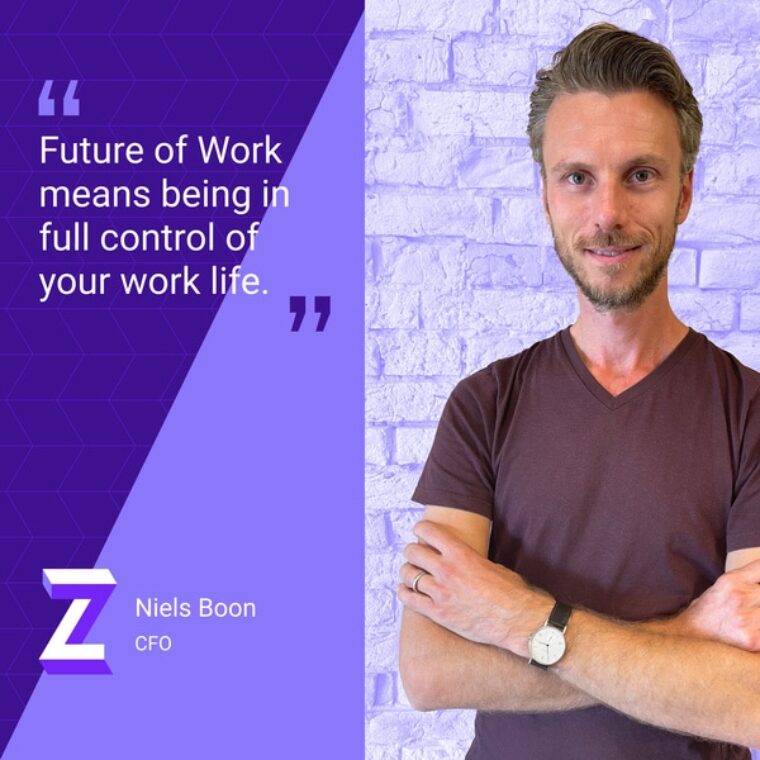CFO Niels talks about the Future of Work

The Future of Work is what we make of it. That’s why we talk to our colleagues on a regular basis. We want to know what their everyday working lives are like, what they expect from the world of work, and how they imagine the working world of tomorrow. What role does data availability for the future of a company play? As a bonus, we also get very personal insights into the everyday lives of our colleagues. Read all about them and their views on the Future of Work in these interviews.
Niels recently joined Zenjob as new Chief Financial Officer. Being involved in strategic decision making, he especially experiences change in data availability and work environments that help him to operate more effectively. What does that mean for his role as CFO and how can digitization and human elements best work together in the future?
What is your dream job and how does a standard working day in your dream job look like?
My dream job is a job where I experience a strong variety in terms of intellectual challenges, moving from one topic to the next at a fast pace while strategizing with amazing people coming from different backgrounds and experiences.
A ‘standard’ working day could look like this: As a Dutchie I would obviously take my bike, either to the office or a coffee place to meet colleagues or business partners, crunch some numbers, or help different teams solve issues by giving strategic direction and be involved in strategic decision making to bring the company closer to achieving its mission. At the end of the day, I would take the bike home and enjoy some time with my wife and three little daughters.

How much does your new role as a CFO at Zenjob fit this dream? #honest
So far it actually has been close to a dream job! At Zenjob there is no room for getting bored or having a feeling that your hard work will ultimately turn out to have little impact. I’m also very appreciative of the opportunity to work with such a dedicated and professional executive team, which trickles down and can be felt throughout the organization.
How has technology changed your job during the past 5 years?
Things have changed immensely, even during the last 5 years and this has been further accelerated by COVID. In the past the default for me would have been to spend long days at the office, and remotely dialing into a meeting was a clear disadvantage and socially frowned upon. These days I can choose work from anywhere either parts of the day or even the whole day without feeling guilty.
Looking at my role as CFO in particular, the main element that has changed is the increased data availability as well as the speed at which this data is made available, often even in real time.
Furthermore, more often than not the type of data to analyze is from an operational rather than purely financial nature. These so-called lead indicators are especially important at high-growth companies such as Zenjob. For example, by knowing how many companies and talents are being onboarded each week, or knowing the daily acquisition costs or number of new hires we are signing, I can get a good feeling of where the month’s financial performance will land and if needed I can already change course accordingly to fuel even more growth or make sure we reduce speed a little.
Moreover, all this data can be accessed through different dashboards and tools, often even from my phone while on the go. In the old days, financial and KPI insights would only surface two or three weeks after the month had passed, which makes a huge difference if you want or need to respond fast.

The Future of Work is human-centric! Do you agree? What are your hopes and concerns about the ongoing digitisation?
Definitely! Without acknowledging the human aspects of your colleagues and business partners, you cannot succeed in your career as an individual nor be successful as a company.
I hope that we as humanity find a way to balance the benefits of digitization with the human elements of working together and thriving as a society. This includes new ways of working driven by ever increasing technological possibilities, often in a hybrid setting combining the office with working from home.
People have diverse personalities, what works well for one can feel as a disaster for others. Casual talks at the coffee machine, over lunch or dinner will never be replaced digitally, and clearly have a positive impact on the work environment. Yet at the same time, everyone should have the freedom to choose to work from home to better integrate work and private life, especially for people with younger children this makes a significant difference.
Also for the CFO or other roles where data and data tools play an increasingly important role, it will be important to find a balance. No matter how much data or tools become available, manual logic based sanity checks and sheer human experience remain indispensable. Applying these can save a lot of wasteful effort upfront, or steer away from incorrect and potentially harmful conclusions afterwards.
Interesting, right? You might also want to read about Majken’s point of view on the Future of Work.